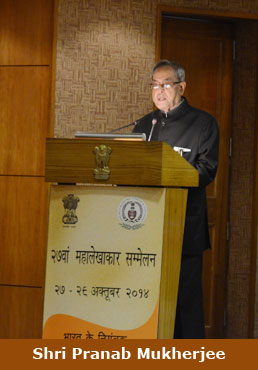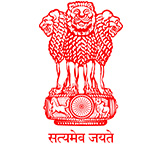XXVIIth Accountants General Conference, 2014
Speech by the President of India Shri Pranab Mukherjee at the inauguration of the 27th Conference of Accountants General on 'Promoting Good Governance & Accountability through Public Audit'
New Delhi : 27.10.2014
 1. At the very outset, I would like to express my deep appreciation to CAG and his office for associating me with this Conference. I am happy to be present for the inauguration of the 27th Conference of Accountants General. Let me begin by complimenting the Audit Institution in India, which has a history of over 150 years. 1. At the very outset, I would like to express my deep appreciation to CAG and his office for associating me with this Conference. I am happy to be present for the inauguration of the 27th Conference of Accountants General. Let me begin by complimenting the Audit Institution in India, which has a history of over 150 years.- 2. In 1858, this supreme audit authority was called the Accountant General. The authority was re-designated four times before the adoption of the Constitution when the term Comptroller and Auditor General (CAG) of India was provided.
- 3. Under Article 148 of our Constitution, the CAG is an independent constitutional authority which is neither a part of the legislature nor the executive. Article 151 prescribes that the reports of the CAG relating to the accounts of the Union and the States are submitted to the President or the Governor of the State respectively and they shall cause the reports to be laid in the Parliament or the State Legislative Assembly.
- 4. Evidently, the founding fathers of our Constitution had envisaged a prominent role for public audit in our country's governance and accountability framework. The concept is not new. In the old treatises, ancient texts of administration, particularly Arthashastra, Kautilya prescribed extensive arrangements for accounting and auditing. The organizational structure for financial management comprised two distinct hierarchies - a Treasurer and a Comptroller-Auditor – both were directly responsible to the King. He placed high premium on public audit conducted by incorruptible officials. I am happy to note that during this Conference, the participants will have the opportunity to deliberate on the achievement of this vision. I also take this opportunity to mention that all CAGs so far, without any exception, have displayed exemplary courage, integrity and excellent performance.
Ladies and Gentlemen :
- 5. Good governance is the exercise of power, within the framework of the Constitution, for efficient and effective management of our economic and social resources for the well-being of the vast multitude of the people, through the institutions of state. But it has to be nurtured. Audit institutions play an enabling role in ushering in good governance in democratic functioning.
- 6. Accountability of public functionaries is an integral part of any good governance framework, more so in a democratic polity. Accountability of public servants extends to maintenance of probity in official dealings, compliance with legal obligations and commitment to efficient delivery of public service. In recent years, there has been a global surge in demand for accountability of those entrusted with governance. In a parliamentary democracy like ours, the executive is held accountable to the Legislature. The reports of the CAG submitted to the Legislature play a seminal role in the enforcement of accountability.
- 7. The audits by the Indian Audit & Accounts Department under the CAG cover the three tiers of government and other instrumentalities of the State. The CAG is also the only supreme audit institution with an accounting mandate as well. The Constitution has placed this institution at a vantage point providing it with insight into performance of different agencies engaged in financial administration of our country.
- 8. The broad audit mandate provides the CAG access to programme and project implementation at national and sub-national levels. You scrutinize the allocation and flow of public funds between different implementing authorities. Thereafter, you evaluate and report on their prompt and effective utilization, disseminate good practices and stimulate course correction through identification of bottlenecks. The perspective available to you by virtue of auditing multiple governance entities provides valuable inputs for promotion of good governance in the country.
Ladies and Gentlemen :
- 9. Audit is a means to an end rather than an end in itself. While audit findings are a barometer of good governance, their utility is manifested only when all the stakeholders, particularly the Executive, Legislature and citizens believe in the credibility of these findings and use them for enhancing the quality of governance. This casts a great responsibility on the public auditor to conduct audit professionally with utmost diligence and independence, and to report in a fair and balanced manner. Both the public auditor and the audited entity have to recognize that the objective of audit is ultimately to improve the implementation of governance strategies. Towards this end, audit should be considered a tool for improvement.
- 10. Accountability of the Executive stems from the requirement ofrendering of an accountto the Legislature that authorized it to tax and expend. Here I would like to mention that more time needs to be devoted in Parliament for detailed scrutiny of financial proposals and financial matters. The Audit report is a valuable input for the authorities empowered to hold a public functionary to account, in making judgments on their level of performance and recommending improvements. In India, this responsibility is vested with the Public Accounts Committee and Committee on Public Undertakings that act on behalf of the Legislature. Effective functioning of these legislative committees, and close association between them and the audit authorities are a blueprint of audit effectiveness, and through it, of governance practices.
- 11. There is no static finality about the scope and objective of public audit. They are shaped by societal concerns which find expression through legislative enactments and judicial pronouncements.
- 12. The frontiers of public audit have been the subject of public debate and litigation in our country recently. Judicial verdicts have underscored the paramount role of our audit institution in ensuring parliamentary accountability in use of public resources by any entity, whether in the public or private domain. The right of CAG to carry out performance audits of government entities and to verify underlying transactions of even private concerns to provide assurance about the State receiving its legitimate share of revenues arising out of the use of public resources is now well established. This paradigm shift in your audit mandate encourages development of appropriate policies and procedures to govern your audit process. It calls for substantial capacity development in your Department. I hope that the recommendations of the Conference on the sub-themes 'Emerging areas of audit' and 'Capacity building in Indian Audit & Accounts Department' will address these concerns.
Ladies and Gentlemen :
- 13. The platforms used for delivery of public service influences the conduct of audit. As 'Digital India' becomes the backbone of government functioning, it calls for transformation in the traditional methods of audit. The leverage that e-governance can provide for improving efficiency, cost and coverage of audit have to be utilized well by revisiting your standard operating procedures.
- 14. In States where the CAG has an accounting role, there is scope to improve services without compromising on due diligence. You must proactively engage with the States in their programmes for modernization of government accounts and financial management systems. Partnerships already initiated by you have to continue to make accounting an effective tool for accountability.
- 15. Time-bound delivery of goods and services by public functionaries is the right of citizens. It is not a bounty from the State. Many States have legislated for prompt delivery of public services. The institution of CAG can facilitate successful implementation of this legal right by reporting through its compliance audits the achievement of these performance standards by public authorities.
Ladies and Gentlemen :
- 16. Sir Walter of Henley's 13thCentury Treatise of Housebandry mentions and I quote: "The Auditors ought to be faithful and prudent, knowing their business…. It is not necessary so to speak to the Auditors about making audits for they ought to be so prudent, and so faithful, and so knowing in their business, that they have no need of others' teaching about things connected with the accounts" (unquote).
- 17. The value of an audit system, where no outsider prescribes as to how to go about auditing, is universally recognized. The institution of CAG of India is no exception. Such trust in the capability and independence of your institution also casts a huge responsibility on you to keep your knowledge up-to-date and to uphold highest professional standards. Public auditing is a knowledge-based venture. Knowledge is fast multiplying. I am confident that you will be up to the task in keeping yourself abreast of latest developments in diverse fields of contemporary relevance.
- 18. Remember that as watchdogs of national public finances, the institution of CAG has a positive and pre-eminent role in accelerating national development. With these words, I conclude. I wish you all the very best in your endeavours.
Thank You.
Jai Hind. |







